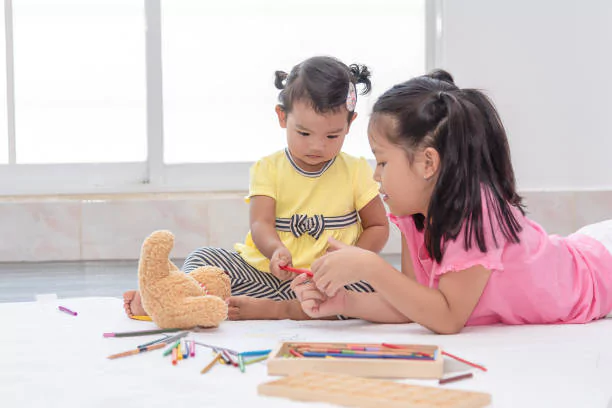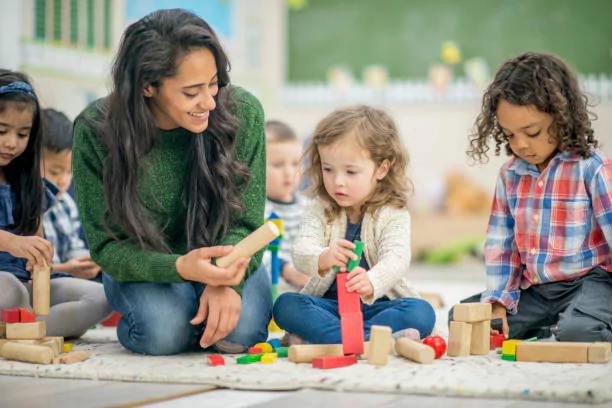The child gives us a beautiful lesson – that in order to form and maintain our intelligence, we must use our hands
– Maria Montessori

In 1907, Italy’s first female doctor and teacher, Maria Montessori, started the Children’s House in Rome for kids in a poor area. She created a special way of teaching that sees children learning the most in their early years (from birth to six). This approach is about looking at a child’s learning as a whole.
Every parent wants their child to receive the best possible education, but navigating the ever-present debate between Montessori and traditional methods can feel overwhelming. Choosing the right path for your unique child can seem like an impossible puzzle with their contrasting philosophies and approaches. This blog aims to guide you through the key aspects of both methods, empowering you to make an informed decision that nourishes your child’s individual needs and potential.
Understanding the Philosophies

Montessori
Imagine a classroom teeming with children engaged in self-directed exploration, each following their curiosity and learning at their own pace. This is the essence of the Montessori philosophy, which emphasizes individualized learning, child-led exploration, and respect for each child’s unique developmental journey. Montessori teachers act as facilitators, guiding children with gentle encouragement and age-appropriate materials that spark their natural desire to learn.Traditional Education
Picture a structured classroom where the teacher leads the instruction, delivering knowledge through lectures, textbooks, and standardized tests. This traditional approach aims to equip students with a strong foundation in core subjects and develop essential academic skills through a teacher-centered curriculum.
Similar Read: RICHLAND SCHOOL DISTRICT – ALL YOU NEED TO KNOW IN 2024
Differences between Montessori and Traditional Education
| Aspect | Montessori Education | Traditional Education |
|---|---|---|
| Approach | Child-centered, holistic learning | Teacher-centered, structured curriculum |
| Classroom Structure | Mixed-age classrooms with freedom of movement | Same-age classrooms with fixed seating and structure |
| Curriculum | Child-directed, emphasis on hands-on, experiential learning | Teacher-directed, structured lessons and textbook learning |
| Learning Environment | Emphasis on a prepared environment promoting independence | Standardized classrooms with desks and teacher authority |
| Role of the Teacher | Facilitator, guide, and observer | Instructor and authority figure |
| Assessment | Continuous observation and individual progress assessment | Standardized testing and grades |
| Collaboration | Encourages collaboration and social interaction | Limited collaboration, individual focus |
| Motivation | Intrinsic motivation, fostering a love for learning | External motivation, grades, and rewards |
| Creativity | Emphasis on creativity and self-expression | Limited emphasis on creativity, focus on academic content |
| Time Management | Flexible schedules, allowing for uninterrupted work periods | Fixed schedules with specific class periods |
Choosing the Right Fit
Now, the crucial question: Which approach is better for your child? The answer lies in their unique needs and personality.
- Learning Style: Does your child thrive in a self-directed environment or prefer clear instructions?
- Personality: Is your child independent and inquisitive, or do they benefit from more structured guidance?
- Needs and Goals: Does your child have specific learning needs or require individualized attention? What are your long-term educational goals for them?
Similar Read: ACADEMIC EXCELLENCE: BALANCING IT WITH TRUE LEARNING
Remember: There’s no single “right” answer. Both Montessori and traditional education offer valuable experiences. By understanding their core principles and carefully considering your child’s traits and aspirations, you can confidently choose the path that unlocks their full potential.
Conclusion
Ultimately, the most important factor is providing your child with an educational environment that nurtures curiosity, fosters growth, and helps them blossom into confident, lifelong learners. Remember, the journey of education is unique for every child. Choose wisely, support them wholeheartedly, and watch them flourish!
Moonpreneur is dedicated to transforming conventional education, preparing the next generation with comprehensive learning experiences. Our Innovator Program equips students with vital skills in AI/ML, Robotics, Coding, Game Development, and App Development, fostering entrepreneurship through hands-on learning. This initiative aims to cultivate the workforce of tomorrow by integrating innovative technologies and practical skills in school curriculums.
Register for a 60-minute free workshop today!
























